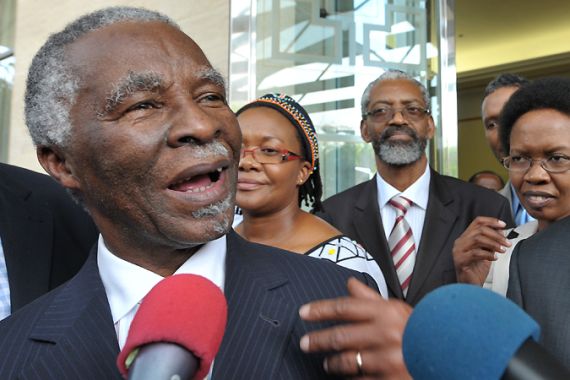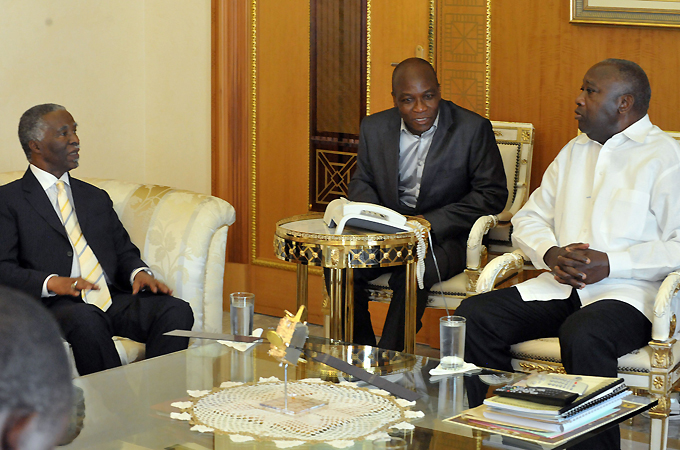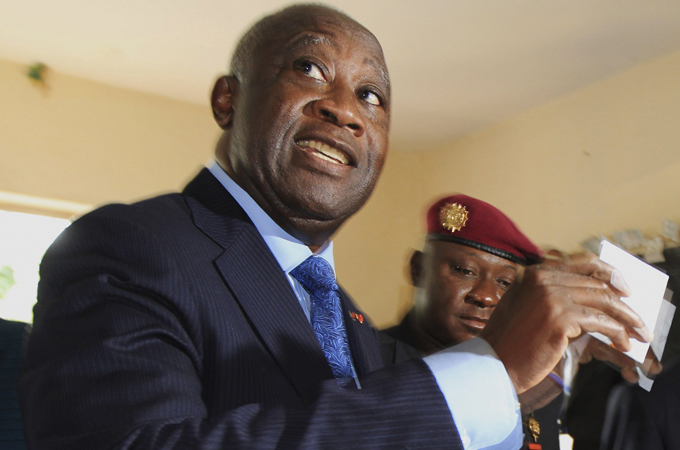Mbeki undertakes Ivorian mediation
Ex-South African president in Cote d’Ivoire on mission to resolve crisis following presidential vote.

 |
| Few observers are expecting an immediate breakthrough from Mbeki’s mediation on Sunday [AFP] |
Thabo Mbeki, the former South African president, is in Cote d’Ivoire on a mediation mission aimed at resolving the political crisis engulfing the West African country.
Working on behalf of the African Union, Mbeki arrived on Sunday to try to solve a dispute over last week’s presidential election which has seen both candidates take competing oaths of office, raising the prospect of violent clashes between rival supporters.
Laurent Gbagbo, the incumbent, was sworn in as president on Saturday despite the country’s election commission declaring his rival, Alassane Ouattara the winner of the runoff.
Mbeki spent the day holding meetings with the different parties, including Gbagbo, Ouattara, the constitutional council and Y J Choi, the special representative of the UN secretary-general.
“We want to hear all points of view about this matter before we can make any recommendations
about what to do,” he said.
South African officials said the Mbeki visit was due to last one day.
Al Jazeera’s Yvonne Ndege, reporting from Abidjan, said that it was unclear how much influence Mbeki would have on the two parties.
“From everything we can see here, it seems very unlikely that President Gbagbo will listen to Thabo Mbeki,” she said. “He’s in a very strong position, having been sworn in legally as the president.”
Gbagbo sworn in
The country’s constitutional court, led by an ally of Gbagbo, overturned the result after throwing out thousands of votes from areas that supported Ouattara over fraud claims.
The decision came despite the result of the election being certified by the United Nations, which did not have major concerns over the way it was conducted.
The US, France and the UN called on Gbagbo to accept defeat, but the president, whose term ended in 2005 but has put off holding elections, went ahead with the inauguration in a ceremony boycotted by most foreign ambassadors.
 |
| Gbagbo was sworn-in on Saturday, despite provisional results suggesting he lost the election [Reuters] |
Hours later, Ouattara announced that he had held his own inauguration ceremony and swore in by email, announcing his intention to form a parallel government.
Guillaume Soro, the country’s prime minister, resigned on Saturday in protest over Gbagbo’s swearing-in, saying that the move “threatens the ideal of reunifying the country” after a civil war from 2002-2003. He handed his resignation to Ouattara, who he addressed as the nation’s president.
Few observers hope for an immediate breakthrough. Mbeki mediated in the post-war crisis and several peace deals were signed but the process eventually stalled.
Gbagbo had then opened talks with Burkina Faso President Blaise Compaore, whose mediation led to a 2007 deal on a power-sharing government.
Gbagbo has controlled the country for a decade but now faces isolation and possibly sanctions.
Despite Ouattara’s international support, Gbagbo holds many of the key elements of power, including the army and the state media.
Yao Gnamein, an adviser to Laurent Gbagbo told Al Jazeera that the controversy in Cote d’Ivoire was no different from that over the 2000 elections in the US and denied the country is heading to civil war, claiming the strife on the streets of the country is a normal part of the democratic process.
“I think that in all the countries around the world, an election is never totally perfect,” he said.
“The electoral commission is an administrative chamber. So after the election, it has to record the result and to transfer the result to the constitutional court.”
As the electoral commission did not communicate the results to the court within the timeframe of two days, he argued that the results were invalid. By declaring Gbagbo the winner, he said, the court was acting according to the constitution.
He made no mention of the barriers the electoral commission faced in announcing the results, which included the commission’s president having the papers ripped out of his hands when he was about to formally declare the results in favour of Ouattara.
Fears of violence
It had been hoped that the poll, the first in a decade, would restore stability to Cote d’Ivoire and reunite a country split into north and south after the civil war.
In the northern town of Bouake, the stronghold of rebels opposed to Gbagbo, tens of thousands of Ouattara supporters demonstrated outside the local headquarters of the UN peacekeeping mission demanding that Gbagbo step down.
“Gbagbo thief!” his supporters chanted, carrying signs with slogans including “Ten years in power – nothing good”.
 |
| Alassane Ouattara won 54 per cent of the vote, but a top court overturned his victory [AFP] |
Instead, analysts fear the country is teetering on the brink of a new round of fighting, with former rebels lining up in support of Ouattara and the Ivorian military supporting Gbagbo.
New Forces rebel commander Cherif Ousmane warned that his followers would “not rest for long without doing something” about Gbagbo if he continues to hold power. He did not specify what that would entail.
Meanwhile, the Ivorian military has said it will carry out “any mission” given to it by Gbagbo, a top general announced on state television.
Small-scale protests and tyre-burning broke out on Saturday in several towns,and gunfire was heard in the largest city, Abidjan. At least 15 people have been killed in election related violence.
Hamadoun Toure, the UN’s special envoy, told Al Jazeera that the 9,000 UN peacekeepers who are stationed in the country would be keeping to their existing mandate of “providing peace and security in the country” if violence over the standoff breaks out.
Hundreds of Ivorians have fled across the border to Liberia to escape political violence, Saah Nyumah, head of Liberia’s Refugees Repatriation and Resettlement Commission, said on Sunday.
“There are more than 300 Ivorians who have already crossed the borders into Liberia. They are mostly women, children and elderly people who have apparently decided to seek refuge in Liberia out of fear of post electoral violence,” he said.